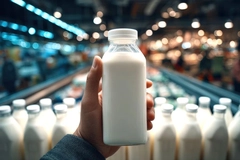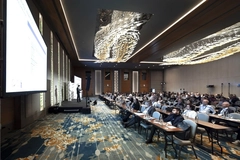Australian start-up Uluu deploys seaweed as plastic replacement to improve ocean environments

27 Jun 2023 --- Perth-based start-up Uluu uses naturally farmed seaweed to make pellets that can be turned into any form of plastic. The seaweed farms offset more carbon than they emit and clean pollutants from the ocean, making them carbon negative.
The pellets can be used in various products such as cosmetics, fabrics and packaging. The material is entirely recyclable and biodegradable in natural environments.
The seaweed can be “tweaked to mimic all kinds of plastics” in the “world’s first” carbon-negative and home compostable polymer, using Australian biotechnology.
The plastic-like material has a clean production process using ocean resources – seaweed, seawater and saltwater microbes. Uluu utilizes farmed seaweed rather than terrestrial crops or waste as a carbon source. The company says this provides economic advantages and the potential to scale enough carbon to decouple the polymer economy from fossil fuels.
 Uluu makes pellets from seaweed that can be transformed into almost any plastic application. Reducing chemicals
Uluu makes pellets from seaweed that can be transformed into almost any plastic application. Reducing chemicals
Julia Reisser founded Uluu to produce a versatile range of safe, natural polymers that could replace plastics. The company says the material is durable yet biodegradable, including in cold, dark conditions like the ocean. However, in dark parts of the ocean, it can take several months for decomposition.
Once the pellets enter the ocean, they can contribute to ocean re-oxygenation, de-acidification and marine habitat provision, according to Uluu. While breaking down, the plastic replacement has eutrophication remediation and reduction of harmful bloom events caused by industrial runoff.
The seaweed-developed plastic is produced via fermentation – like brewing beer. Using salt water, Uluu says their process eliminates the need for costly and harmful chemicals and the energy-intensive, slow equipment sterilization processes.
Another goal of Uluu’s creation is to improve the lives of vulnerable people in the seaweed supply chain, who are often female farmers living below the poverty line and in remote coastal communities.
Last year was Uluu’s second year being featured in The Australian’s The List: Top 100 Innovators.
Australia’s waste management  The seaweed-based packaging material can de-acidify the ocean when biodegrading.
The seaweed-based packaging material can de-acidify the ocean when biodegrading.
Environmentalists have previously criticized Australia’s waste management. The country fell behind its promises for 2025, seemingly lacking in its waste reduction target.
Between 2016-2017, Australia generated 2.7 metric tons of waste per person. According to government reports, 16% of the country’s plastic packaging was recycled or composted from 2019-2020 – down 18% from 2018-2019.
The Australian government has found 44 stockpile locations of soft plastics across the country from REDcycle’s failed recycling scheme. The estimated weight of the stockpiled soft plastics stands at 12,350 metric tons.
However, companies such as Uluu are trying to redesign packaging to improve waste management on the continental island. Similarly, Fungi Solutions is developing packaging solutions from mushrooms to create compostable packaging for the Australian market. The start-up packaging company based in Melbourne aims to divert organic waste from landfills.
By Sabine Waldeck











